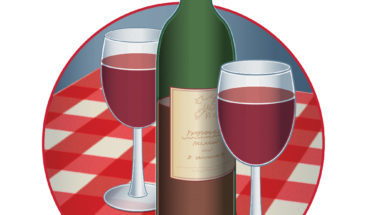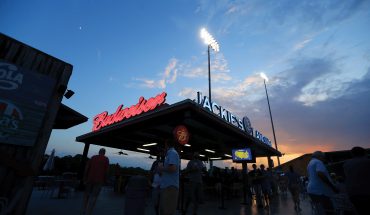The stands of the Durham Bulls Athletic Park may be empty, but the memories and traditions of watching local baseball endure—and we’ll get out there again!
by Will Lingo | photography by Bob Karp
Years ago, the area around the American Tobacco Co. factories and warehouses in downtown Durham was essentially abandoned, home to a car dealership and blocks of empty buildings. Then the Durham Bulls built a ballpark at the corner of Blackwell Street and what is now Jackie Robinson Boulevard. If you build it, they will come, so to speak.
The change didn’t happen overnight, but it happened. First came a new county jail building, from which inmates enjoyed post-game fireworks. Then an office building sprang up beyond right field. Then, the redevelopment of the tobacco warehouses. Slowly, downtown Durham took off.
The Durham Bulls Athletic Park (DBAP) serves as the centerpiece. It’s flanked by development on all sides and brings thousands of people together around its bright-green grass 100 times a year, give or take. Or at least, that’s the way it’s supposed to be.
None of us will forget 2020, but for the Durham Bulls, there will be nothing to remember. Coronavirus stopped all sporting events in their tracks, and while most of the major league sports were able to return for some semblance of a season, minor league baseball had no such luck.
The Bulls would have celebrated the 25th anniversary of the DBAP this season. Instead, it feels a lot like it did in the 1990s: deserted, with no reason to hang around in the evening.
The Bulls are an icon of the minor leagues, but even more than that, a part of the fabric of living in the Triangle. In 25 seasons at the DBAP, the Bulls have made tons of improvements, while keeping touchstones like the snorting bull—Hit Bull, Win Steak—looming in left field over the Blue Monster and its manual scoreboard, though it now sits anachronistically below a gigantic video board. The main concourse brings the familiar smells and sights as people wait in line for hot dogs, beer and still, inexplicably, Dippin’ Dots (ice cream of a future that will never arrive).
The bullpens are right next to the stands down the first- and third-base lines, and fans test the waters to see how chatty the pitchers are and maybe score a souvenir baseball. The familiar voices of public-address announce Tony Riggsbee and radio voice Patrick Kinas. And the antics of Wool E. Bull, including his drive around the warning track in his go-kart, after which it always smells like somebody just mowed the lawn.
We absolutely miss all of those things, but the biggest void is sharing the experience itself. No other sport matches the experience of live baseball. No other sport invites sitting back and cracking open peanuts, drinking a beer and chatting, in quite the same way. You can watch baseball and people watch at the same time, and it’s almost a given at DBAP.
You know that most people will never remember who won that particular game, nor could they tell you who the Bulls’ opponent was. That family with young kids definitely won’t even be there when the game ends; they played the cotton candy card in the third inning. There’s always the cute old duo that has someone keeping score. The college kids and 20-somethings who just enjoy outside drinking. Couples on dates, and couples dates. Kids in uniforms. Tourists wearing spanking-new Bulls caps. Work gatherings with the young go-getters trying to impress somebody. Spouses looking bored and veterans enjoying the free food.
Of all the things we have learned to live without this year, human contact has been the hardest to replace. And that’s particularly true of a night at the ballpark with a few thousand of your closest friends, sharing an experience and then leaving restored, win or lose.
Instead of the sounds of the ballpark organ drifting onto nearby streets, this summer it has been the sound of silence. The field hasn’t seen a pitch or a hit, and ballpark lights have remained extinguished.
But we wait for the time when the light will shine again. And we’ll be ready to fill those stands.










